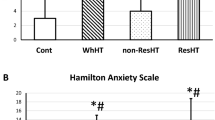Summary
Tests used to evaluate the impact of drug therapies on mood and well-being need to be more sensitive than standard psychiatric tests, and specific procedures for the construction and validation of such instruments have been developed. Suitable questions are selected from an initial pool of possible test items and a questionnaire is formed. This undergoes a pretest procedure to eliminate any unclear or offensive questions and is then evaluated in a suitable group of patients for validity, responsiveness (i.e. sensitivity) and reproducibility.
Using tests developed in this way, it has been shown that the transfer of hypertensive patients from standard triple therapy to placebo is accompanied by an increase in perceived well-being. Subsequent treatment with enalapril produced a further small increase in wellbeing. These and other results indicate that although angiotensin-converting enzyme (ACE) inhibitors may not have positive mood elevating properties, they are beneficial in terms of quality of life during treatment.
Similar content being viewed by others
References
Callender JS, Hodsman GP, Hutcheson MJ, Lever AF, Robertson JIS. Mood changes during captopril therapy for hypertension. A double-blind pilot study. Hypertension 5: III-90–III-93, 1983
Croog SH, Levine S, Testa MA, Brown B, Bulpitt CJ, et al. The effects of antihypertensive therapy on the quality of life. New England Journal of Medicine 314: 1657–1664, 1986
Dahlöf B, Andrén L, Eggertsen R, Jern S, Svensson A, et al. Potentiation of the antihypertensive effect of enalapril by randomized addition of different doses of hydrochlorothiazide. Journal of Hypertension 3 (Suppl. 3): S483–S486, 1985
Guyatt GH, Bombardier C, Tugwell PX. Measuring disease-specific quality of life in clinical trials. Canadian Medical Association Journal 134: 889–895, 1986
Jern S. Assessment of psychic side-effects of antihypertensive drugs. Acta Medica Scandinavica Suppl. 693: 103–106, 1985
Jern S. Quality of life and hypertension. In Hansson (Ed.) Hypertension Annual 1987, Gower Academic Journals, in press
Olajide D, Lader M. Psychotrophic effects of enalapril maleate in normal volunteers. Psychopharmacology 86: 374–376, 1985
Wenger NK, Mattson ME, Furberg CD, Elinson J. Assessment of quality of life in clinical trials of cardiovascular therapies. Le Jacq Publishing Inc; New York, 1984
Zubenko GS, Nixon RA. Mood-elevating effect of captopril in depressed patients. American Journal of Psychiatry 171: 110–111, 1984
Author information
Authors and Affiliations
Rights and permissions
About this article
Cite this article
Jern, S. Evaluation of Mood and the Effect of Angiotensin-Converting Enzyme Inhibitors. Drugs 35 (Suppl 5), 86–88 (1988). https://doi.org/10.2165/00003495-198800355-00015
Published:
Issue Date:
DOI: https://doi.org/10.2165/00003495-198800355-00015




